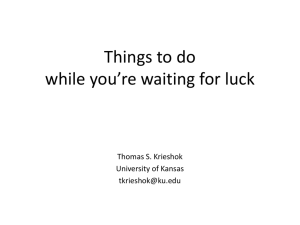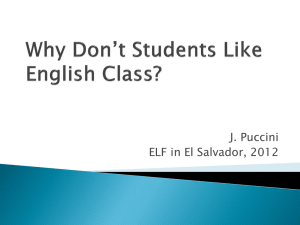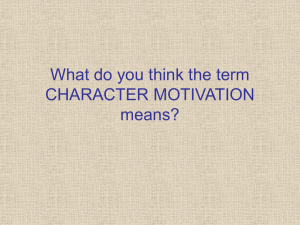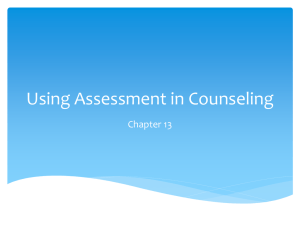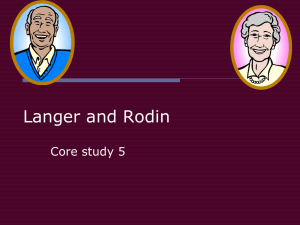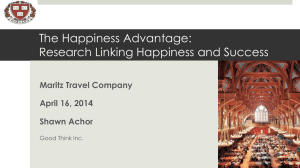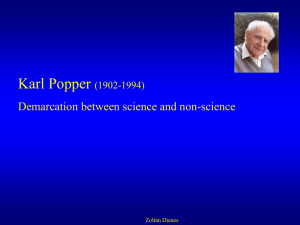Decision Making
advertisement
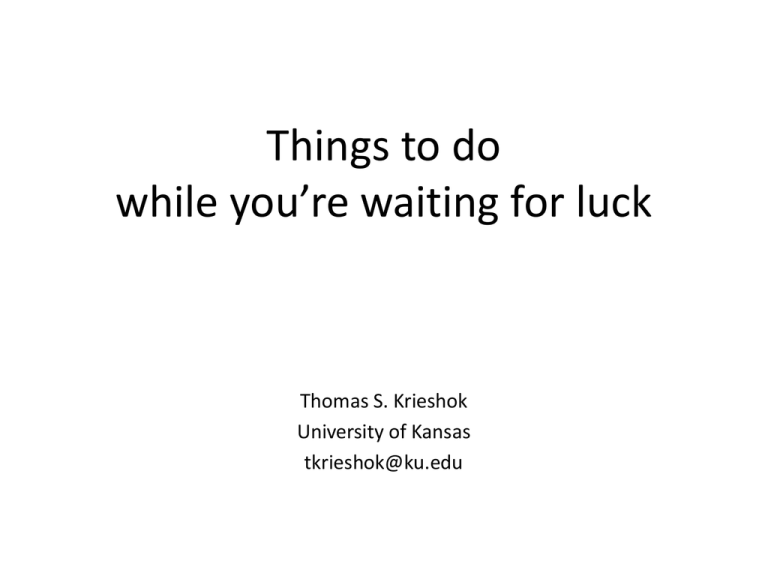
Things to do while you’re waiting for luck Thomas S. Krieshok University of Kansas tkrieshok@ku.edu Key Points: • The human brain is not designed for happiness • When we try to predict what will make us happy, we make errors • Implications of this for career counseling Members of the A (Adaptability) Team over the years: Chris Ebberwein Mike Black Robyn McKay Rich Scott Melanie Noble Selby Conrad Shawn Bubany Brian Cole John Jacobson Craig Beeson Kate Sirridge Kristin Rasmussen Maggie Syme Sarah Brown Mary Krogmann Matt Robinson Dan Cox Eric Lyche Jeff Rettew Rhea Owens Thomas Motl Abby Bjornsen Wendy Shoemaker Matt Davis Carrissa Huffman Kirsten Wells Michael Rosen Benjamin Rutt Alex Vuyk Aaron Gates Brittany Stewart Erik Clarke Craig Warlick Marlon Beach Michael Ternes Jamie Kratky The readiness is all. 4 Shakespeare Consider happiness • “The word happiness exists in every language; it is plausible the thing itself exists.” Jorge Luis Borges • How might the research on happiness inform aspects of career counseling Consider happiness • We want that which we believe will make us happy • We set about getting that • But often end up less happy than we imagined Not designed for happiness • Humans not designed for Happiness, but Survival and Reproduction • We always want just a bit more wealth, privilege, beauty, and youth • Precursors to survival and reproductive likelihood • The Hedonic Treadmill Not designed for happiness • The human mind as an experience simulator • We are not so adept at predicting the intensity and duration of our future emotional reactions • Affective Forecasting (Wilson & Gilbert) Side Effects of human design • 1. We overestimate our ability to get things done in the future • 2. We underestimate our resourcefulness for dealing with obstacles • 3. Consciousness only sees a movie about reality Side Effects of human design • Leads to Miswanting • We think something will make us happier than it does ...and based on faulty assumptions, • We avoid things we expect will be difficult Side Effects of human design • So we want things we won't end up liking • And we resist wanting things we would end up liking Doing better but feeling worse (Iyengar, Wells, & Schwartz) • College seniors: Maximizers vs. Satisficers • Perceived value of possible outcomes influenced by: – Mis-predicted expectations during the decision process – Affect experienced during the decision process itself – Social values Doing better but feeling worse (Iyengar, Wells, & Schwartz) • Even when they get what they want • Maximizers may not want what they get Human Design Issues • The brain is part of the problem • Areas for Wanting ≠ Areas for Liking Human Design Issues • Amalgam of brain systems • Cobbled together over time • To adapt to evolving environmental demands System 1 and System 2 • System 1: Intuitive, non-conscious mind -related to “older” functions of the brain • System 2: Rational, often conscious mind -related to “newer” functions of the brain -especially language System 1 and System 2 • The Elephant and the Rider (Haidt) – The elephant - System 1 • (Bargh’s ‘Wise Unconscious’) • Makes most day to day decisions – The rider - System 2 • • • • Has some input, but not as much as we think Acts as an Interpreter Module (Gazzaniga) Fabricates reasons for behavior Makes errors in guessing those reasons Wanting vs. Liking • Liking depends more on System 1 and automaticity • Wanting depends more on System 2 – Influenced by socialization, gender proscriptions, ... – Subject to heuristics and errors Wanting vs. Liking • What do I want? is really: What would somebody like me want? What would/should somebody with my identity/self concept want? • But identity is a socially constructed entity • My story is ABOUT reality, not reality itself The heart has its reasons, that reason knows not of. Pascal There’s someone in my head, but it’s not me. Pink Floyd Wanting ≠ Liking • Implications for career counseling • A particular issue for the matching model Matching Model • Self-knowledge – What do you want in your work? • World of work knowledge – What's out there? • True reasoning – Match the first to the second • Match me to work that will bring me happiness Matching Model • What I really need to match to: – Is not what I WANT – But what I'd LIKE Matching Model • A better quesion: • What kind of work will give me what I Like? • Figure out what you Like • & Plan with that knowledge Wanting is cheap Liking is expensive • Wanting is easy: I can tell you what I want • Liking is expensive data – I have to develop a history of likes across domains Knowing my Likes • Thomas Motl: Teasing out wanting & liking • Beforehand: Do you think you will like it? • While you are doing it: Do you like it? • Tomorrow: Did you like it? • Ask me on an interest inventory: – "Is this something you like?" Knowing my Likes • System 1: You have to put yourself in places where you have the opportunity To Like or To Not Like • System 2: You have to pay attention to what happens • You have to know that System 2 is subject to errors and distortions Trilateral Model of Adaptive CDM Reason System 2, Rational System, Reflective System. Intuition System 1, Experiential System, Reflexive System. Engagement Activities that increase one’s fund of information and experience. The Case for Engagement • “… taking part in behaviors that contribute to the career decision-maker’s fund of information and experience.” • Makes both Rational & Intuitive tools more informed and less naive The Case for Engagement Rationality Intuition Informed Informed Rationality Informed Intuition Naive Naive Rationality Naive Intuition Implications for Career Counseling • Career Counseling clients need convincing about all of this • Hard Sells – Invest time and energy in learning your Likes – Move out of your comfort zone – Recognize your mind is something of a parasite Implications for Career Counseling • Integrate well-researched counseling interventions that address behavior change Implications for Career Counseling • Stages of change – I need to do the work to learn my likes – Where am I in that process? Implications for Career Counseling • Motivational Interviewing – I'm ambivalent about engaging in that hard work Implications for Career Counseling • Acceptance and Commitment Therapy – My thoughts (System 2) are subject to all manner of social influence – My thoughts are not reality – My thoughts have an agenda of their own, often not the same as my agenda for my life Takeaway message • Happiness research tells us: – Knowing what you like is hard – That makes matching more complicated – Career counselors can use behavior change tools to encourage engagement An Extremist Position • Three frightening things about the way we have traditionally thought about decision making. Radical Argument 1: • You don’t get to keep your decision anyway. • Even if there was a time when matching did work, today’s world of work is so turbulent that we can no longer count on keeping our match. Radical Argument 2: • We can’t help you choose rationally, because that’s not how people make choices Ridiculous Argument 3: Opportunity Costs • The matching model implies more control than you really have, and distracts you from doing that which you should really be doing (engaging). Radical Argument 2: Soelberg’s 1967 study with MIT grads • We identify a ‘favorite’ early on • We engage in an ‘exercise in prejudice’ to ensure our favorite wins • We only commit once we have an adequate rationalization 41 Mark Twain: • It ain’t what you don’t know that gets you into trouble. • It’s what you know for sure that ain’t so that gets you into trouble. Examples of Occupational Engagement • • • • • • • Studying abroad Being involved in organizations Talking to anyone at anytime about anything Volunteering Job shadowing Traveling Reading a section of the newspaper you normally don’t 43 Anti-Engagement Messages Students Hear Choose a major by the time you have 45 credit hours You already have a good paying summer job, don’t take an internship that pays less Study Abroad will only extend your time in college Your school work is your job, So don’t volunteer or get a part time job. Go take that test, it will tell you what to do. All you can do with a history degree is teach The most important thing is your grades 44 Our firmest conclusion: • Be Engaged!!! – Better chance your intuition will be expert • Be prepared! (always be engaged) – Ebberwein’s study of laid off workers 45 Ridiculous Argument 3: Opportunity Costs • The matching model implies more control than you really have, and distracts you from doing that which you should really be doing (engaging). Chaos in the world of work • Science lets us predict on a grand scale – Can predict 10% unemployment • Not so much at the elemental level – Which workers will lose their jobs – Which businesses or industries will survive 47 Understanding & Believing in chaos is important • Make your job loss less personal • Make your job search less trusting in a fair system of job hunting 48 Getting a job is ALWAYS a matter of being in a right place at the right time. • -There are NO exceptions to this rule • -In spite of how it looks – or what others try to tell you 49 Drat that chaos! • Wisdom and science tell us: Vision and Planning fare better. • But what of those who fail with a plan – or succeed without? • Getting a job is always a matter of being in the right place at the right time. Need to accept the limited amount of order in the World of Work • learn to adapt on the fly • capitalize on idiosyncratic events • let go of our demand that the world be completely ordered • and soften our rigid hold on reality Chinese proverb • To be uncertain is uncomfortable, • But to be certain is ridiculous. On being human • Things change – We adapt – We survive On being human • Things are changing on a massive scale – We are adapting, but at a human pace • If we fail to adapt, we risk negative consequences: – personally, nationally, globally But adaptability is limited • As humans, we require predictability for survival. – And predictability yearns for stability – Language tends to create patterns of predictability, even when they aren’t there • I’ll take the devil I know vs. the devil I don’t Ideal vs. Real • Ideal starting point: Adaptable, Wise, Smart • Real starting point: Real humans, with modular brains, language bound, chaos avoidant • Ideal environment: Savannah • Real environment: Chaos Leads to several dialectics Dialectic #1: Decidedness Decidedness feels better than undecidedness: so work to get decided but… Decidedness cannot be forced. If it happens, so be it; if not, you have to leave it alone. And it might never come. Dialectic #2: Planning Having a good plan is essential but: It’s always a matter of being in the right place at the right time. Dialectic #3: Flow Our STORY about work is that it’s a drudgery. but… The reality is that we are in flow when we are at work more so than in any other role. Dialectic #4: The Zen of Career Act as though every moment is absolutely critical to your career success but… Laugh at the idea that career success is important at all. Dialectic #5: Commitment within Relativism Be out front with a passionate plan but Wake up every day to the possibility that today might be the day you receive your next calling. Planned Happenstance John Krumboltz • Combines planfulness with an appreciation for happenstance – How might we exploit chaos in a positive way? – How might we learn to embrace situations? – Can we create such situations? Planned Happenstance Take-home Lessons • Reinforce the role of chaos in the world of work • Identify past experiences of happenstance • Encourage creativity in planning for happenstance A Proposed NEW Biggest Problem: • ADAPTABILITY: – Developing an Adaptive relationship to the marketplace Adaptability in the marketplace • Ability to move about in… • Transition into and out of… • Accurately appraise one’s strengths and weaknesses as a player in the marketplace • Not one’s abilities as a worker per se Adaptability as the new GOLD Standard • From Match-Making to Meaning-Making. • Development is continually adapting to a changing environment – RATHER THAN an internal impetus to maturation Things to do while you’re waiting for luck • 1. Being a great student and worker is not enough – We need to be adaptive agents – With a healthy relationship to the marketplace. • 2. Avoid choosing until you have developed your expertise – Differentiate Decidedness from Commitment • 3. Don’t always trust what your thoughts are telling you. – Your thoughts are not your friends. – Rational explanations may be driven by other agendas Things to do while you’re waiting for luck • 4. Feed your intuition Engage your 11,000,000 bit processor Instead of your 20 bit processor • 5. Consult with trusted others, especially on your strengths • 6. Don’t spend too much time in self assessment Things to do while you’re waiting for luck • 7. Most of all, ENGAGE – Set yourself up for planned happenstance • 8. Once (re)employed, STAY engaged • 9. Choose Action over Decision (Savickas) • 10. Lead a value-driven life – Instead of a quest for a pain-free life To summarize: • 1. Feed your intuition • 2. Avoid choosing until you have developed your expertise • 3. Don’t always trust what your thoughts are telling you. – Rational explanations may be driven by other agendas 70 To summarize more • 4. Consult with trusted others, especially on your strengths • 5. Don’t spend too much time in self assessment • 6. Most of all, ENGAGE – Set yourself up for planned happenstance 71 To summarize one last time • 7. Once (re)employed, STAY engaged – Check the smoke alarms once a month, rather than once a year (Rich Scott) 72 So Dude, like, get out in the world and have some great experiences!
